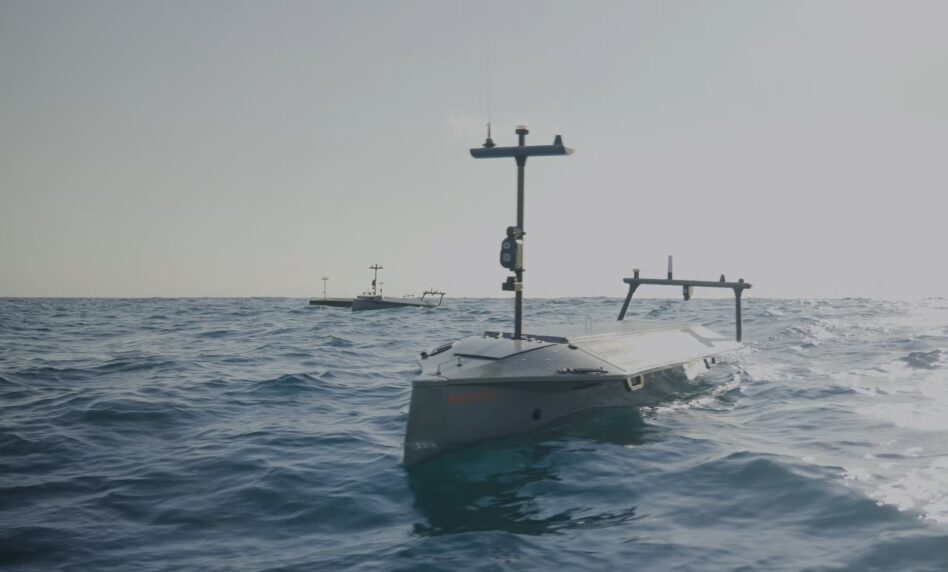For all those SBIR skeptics out there, this one’s for you. In an exclusive release to Tectonic, San Diego-based small unmanned surface vessel (sUSV) startup Seasats announced today that it’s snagged an $89M ceiling SBIR Phase 3 indefinite-delivery/indefinite quantity (IDIQ) contract with the Navy to deliver its Lightfish USVs to the Marine Corps.
Talk about making a splash.
Snap it up: If Seasats sounds familiar, it might be because the startup made waves when its USV snapped a close-up picture of the $900M Chinese destroyer Nanchang northwest of Guam during the USV’s 7,500-mile trans-Pacific voyage from San Diego to Japan.
That sneaky pic might’ve lit lightbulbs over the heads of some Navy procurement folks in terms of what Seasats’ flagship Lightfish USV can offer:
- The Lightfish is 11 feet long, 3 feet wide, and weighs 340 pounds, which puts it in the Navy’s “Very Small Class USV” category.
- Despite its small size, the solar-powered Lightfish, which also has a backup generator, has impressive endurance. It can be out at sea for months at a time (max endurance is six months) in up to Sea State 6+ and can travel thousands of miles autonomously.
- On the payload front, the Lightfish is kitted out with a radar, sensors, and an EO/IR camera that livestreams video to the operator through an onboard Starlink Mini.
- Each Lightfish costs about $250,000, and Seasats says it can comfortably pump out 250 of them per year with the ability to go higher based on demand.
This little boat’s endurance has been pretty thoroughly tested. On top of that Pacific voyage, the Navy tested the Lightfish during the Baltic Operations 2025 (BALTOPS) exercise earlier this summer.
The commander of Task Force 66, the Navy’s task force focused on unmanned systems, said the Navy “put [the Lightfish] through a series of trials to essentially become confident that we could operationalize them for longer durations.”
Small boat, big money: It looks like that confidence could now translate to some big-time cash. The Navy IDIQ, awarded in late September through the Naval Information Warfare Center Atlantic, includes a $70.7M ceiling firm-fixed-price five-year ordering period, though only $2M was obligated at award for the first delivery. If the Navy really takes a liking to the Lighfish, the contract features a two-year option period, which, if exercised, runs through 2032 and brings the total contract ceiling to $89M.
According to the award notice, Seasats will “provide small UMVs capable of persistent intelligence, surveillance and reconnaissance collection in the open ocean, coastal littorals and inland waterways.”
In an interview with Tectonic, Seasats CEO Mike Flanigan wouldn’t get into specifics on what the Marine Corps will be doing with the Lightfish or how many they’ll deliver off the bat, but said the Marines have been “very forward-leaning in adopting new technology” and taking advantage of the “massive asymmetric advantage small drones can provide.”
As to the expected deliveries under the IDIQ, Flanigan added, “I can’t say specific numbers right now, but I’d say it’s fairly large.”
Success story: On top of the big-ceiling contract win, Flanigan is fired up about Seasats’ success in the SBIR program.
“We’re a relatively small company that got an SBIR Phase 1 for early research, excelled in exercises with the DoD, and now NIWC Atlantic jumped this to a production contract to support the Marine Corps’ USV adoption efforts,” he said. “This is how the system is supposed to work.”
Their key to success, he added, has been “repeatedly showing value in many areas.” They already have a number of commercial customers in the oceanographic research and maritime security worlds, but the Marines will now get a chance to see what kind of value Seasats can bring to the open ocean. Chinese destroyers beware.
Correction: In a previous version of the article, the $70.7M firm-fixed-price contract ceiling under the IDIQ’s base 5-year ordering period was not clearly described as contingent on deliveries. The article has been corrected to clarify this point and include a quote from Flanigan regarding the expected deliveries.

